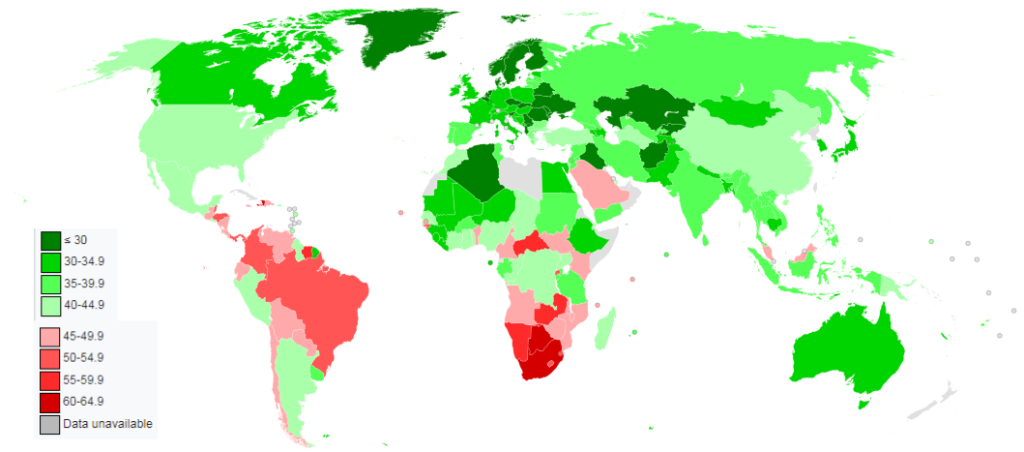
One often hears the argument that inequality destroys societies, but it isn’t easy to understand why. The mainstream media tells us that a rising tide lifts all boats, and so people ought to enjoy the bounty of the modern day without worrying about how other people have more. But the economic psychology of inequality is complicated. This essay explains.
Casting an eye over a list of countries ordered by their degree of income inequality, one trend leaps out: unequal countries tend to be shitholes, and egalitarian countries tend to be decent.
Among the most unequal countries are places like Brazil, Mexico and the majority of African countries. Among the most equal countries are the European ones, Canada, Australia, Japan and South Korea. The pattern is obvious: a strong correlation exists between economic equality and overall quality of life.
The reasons for this can be understood if we compare the motivations of individuals in equal societies to individuals in unequal ones. The simple rule is that once inequality gets to the point where you no longer have a stake in society, then you no longer have a stake in society. This has behavioural consequences.
In an equal society, the members closer to the bottom of it still have enough of a stake to feel engaged. They are not so far from the decision-making level that their desires are ignored. Having a meaningful chunk of power, they are incentivised to work towards society’s betterment (or at least its upkeep).
In equal societies, all members feel a sense of ownership. A sense of pride at the quality of life offered by the society follows naturally. With ownership and pride, a person will take action to uphold that society. This is why people in countries like Sweden, Canada and Australia tend to perform prosocial behaviours like putting their shopping trolleys away and disposing of their litter in bins.
In an unequal society, the members closer to the bottom are without influence. Decisions are made so far above their heads that they aren’t consulted. As such, the people at the bottom are not incentivised towards prosocial behaviour. They perform antisocial behaviours, like aggressive panhandling, theft, robbery, sex crimes and murder.
In a society like this, not everyone feels a sense of ownership. Those who don’t tend to not contribute to society’s upkeep. In exactly the same way that rented cars and houses are treated much worse than personally owned cars and houses, a society in which people can only rent a stake (at best) will be treated much worse than a society in which people can own one.
The inevitable result of increasing inequality is a decline in prosocial behaviour and an increase in antisocial behaviour. You might as well throw that Coke can in the gutter, because it isn’t you that will have to pay to clean it up. In fact, the more damage you can do to society the better, because it will take the bastards who locked you out down a peg or two.
New Zealand might be in the middle of the inequality pack, but it’s still practically impossible to own a home here without inheritance. The average wage today has less than 40% of the housebuying power that it had 26 years ago. Our society is now so unequal that what used to be the elementary sign of having a stake in it – owning a home – is practically a dream unless you’re born rich.
This inequality has all but destroyed our society. It’s easy to see why if one imagines how it has affected people’s motivations.
As a non-landowner who will never own land while the average wage cannot buy the average house, I don’t care what happens to society. I have no stake in it and will never have one as long as the prevailing economic circumstances continue. New Zealand is someone else’s property, and as such I don’t feel motivated to defend it or to do any work to maintain it.
It’s said that if too many people drop out of society, then our economy would collapse, leading to New Zealand becoming ungovernable, perhaps even to civil war. I say: “Good!” If civil war means that I can afford a house in five years, then bring on civil war!
Many people will be appalled to hear such reasoning. But such reasoning is inescapable once a person has no stake in society. If the order of society as being maintained at my expense, then bring on the chaos! It’s irrational to reason otherwise unless one is content to be the slave of the rich, effectively a serf whose labour will never allow them to own land.
Given this psychological calculus, it’s apparent that increasing inequality will inevitably lead to society collapsing as fewer and fewer people feel like they have an interest in keeping it going. Prosocial behaviour will decline, and antisocial behaviour will rise, to the point where the fabric of society no longer exists, and we are back in Hobbes’s state of all against all.
Eventually, inequality will get so bad that intelligent people born poor will realise from early childhood that they never had a chance. These people will be hardened revoutionaries by the time they become adults, and will know nothing other than hate. They will be exceptionally dangerous and capable of ushering in a new order of the world.
*
If you enjoyed reading this essay, you can get a compilation of the Best VJMP Essays and Articles of 2019 from Amazon for Kindle or Amazon for CreateSpace (for international readers), or TradeMe (for Kiwis). A compilation of the Best VJMP Essays and Articles of 2018 and the Best VJMP Essays and Articles of 2017 are also available.
*
If you would like to support our work in other ways, please consider subscribing to our SubscribeStar fund. Even better, buy any one of our books!
